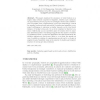Free Online Productivity Tools
i2Speak
i2Symbol
i2OCR
iTex2Img
iWeb2Print
iWeb2Shot
i2Type
iPdf2Split
iPdf2Merge
i2Bopomofo
i2Arabic
i2Style
i2Image
i2PDF
iLatex2Rtf
Sci2ools
COMPLEX
2009
Springer
2009
Springer
Retail Location Choice with Complementary Goods: An Agent-Based Model
This paper examines the emergence of retail clusters on a supply chain network comprised of suppliers, retailers, and consumers. An agent-based model is proposed to investigate retail location distribution in a market of two complementary goods. The methodology controls for supplier locales and unit sales prices of retailers and suppliers; a consumer’s willingness to patronize a retailer depends on the total travel distance of buying both goods. On a circle comprised of discrete locations, retailers play a non-cooperative game of location choice to maximize individual profits. Our findings suggest that the number of clusters in equilibrium follow a power-law distribution and that hierarchical distribution patterns are much more likely to occur than the spread-out ones. In addition, retailers of complementary goods tend to co-locate at supplier locales. Sensitivity tests on the number of retailers and retailers’ sequence of moving are also performed. JEL code: R30, L22 Key words: ...
| Added | 26 May 2010 |
| Updated | 26 May 2010 |
| Type | Conference |
| Year | 2009 |
| Where | COMPLEX |
| Authors | Arthur Huang, David Levinson |
Comments (0)

